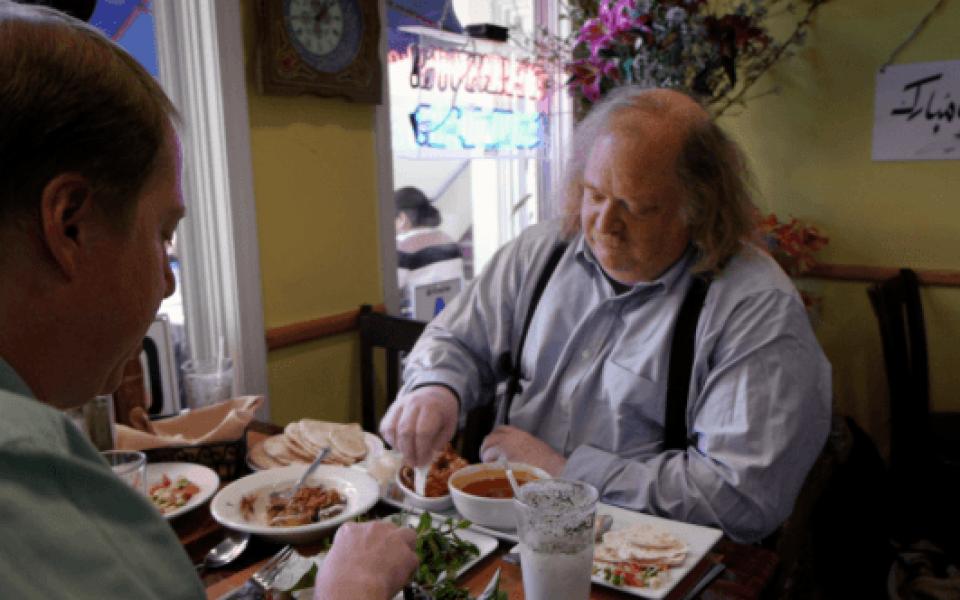by Eric Ginsburg
Generally when a movie makes you want to stop watching and hurry out to do something else, it’s a bad sign.
But that isn’t so with City of Gold, a documentary about renowned food writer Jonathan Gold (which opens this week at A/perture and RED cinemas) — the film incited a burning urge to run out the door, speed to one of the Triad’s immigrant-dominated commercial strips and eat everything in sight.
If you’ve ever enjoyed reading our food section, City of Gold is for you. Gold is one of the forbearers of the modern era of American food writing, careening through outposts of the Los Angeles area on a decades-long hunt for the best dishes around and the human stories behind the people making them. Beginning at LA Weekly — an alternative paper like the one you hold, just a helluva lot bigger — Gold explored the fault lines between cultures in LA, exploring the mosaic of the city through the lens of food on someone else’s dime, as he puts it in the film.
My style of food writing owes a great deal to Gold, and a handful of trailblazers like him, although indirectly — I actually hadn’t heard of him until recently, ironically while out on assignment at a Thai restaurant in Winston-Salem with a friend who enlightened me about the documentary on the man. But Gold, an evocative writer who eschewed the white-linen establishments in favor of hot-dog vendors, Iranian restaurants and more recently, Korean food, inspired countless other food writers to break the buttoned-up mold and explore the nooks and crannies of their cities.
A food writer for the people, rather than the elite.
I don’t mean to compare myself too directly to Gold; listening to readings of his columns in the film made me realize just how inadequate my writing is. Unlike him, I’m usually only able to hit a place once before it appears here, and with no budget to speak of, I try and rope friends into joining me so I can sample from their plates and we can compare informal notes.

©
Gold says at one point in City of Gold that he usually visits a joint four or five times before penning a review — the number is higher if the cuisine is more unfamiliar — though his record is 17. And he doesn’t usually write anything down while he’s there, preferring to absorb it like a piece of spongy naan mopping up curry.
“I rarely take notes when I’m having a meal,” he says, adding, “I mean, you could take notes while you were having sex too, but you’d sort of be missing out on something.”
It’s not just the investment of time and quality of writing that differentiates us; Gold is enough of a culinary rock star now that he has to call in reservations under fake names and using constantly changing numbers as he pursues the everyman’s experience at a restaurant. I generally don’t tell venues that a reporter is on the way for the same reasons, but I’m too small-time to need to conceal my identity around here. (Friends often expect that I’ll be recognized when I’m out working on a story, but nobody’s ever raised an eyebrow until I pulled out a camera when the food arrived.)
Oh, and dude has a Pullitzer for food writing, too.
But there are several crossovers between Gold’s style and my own, enough that while watching the film I aspired to grow into shoes like his with time and enough that I know readers like you will appreciate the film. Gold uses food as a form of social commentary, as a way to try and help people understand geography and place as well as culture and history. His wife explains in City of Gold that his punk phase probably had a profound influence on his methodology and style of food writing, compelling him to push boundaries, reject the norm and embrace dissonance. Listening to her, I realized that my punk days likely did the same for me.
F*** your snobby, overpriced restaurant, teenage punk me would say. Where’s the best burrito around here?
But Gold does much more than pursue the most satisfying and memorable meals he can find; he illuminates huge swaths of a city that would likely go unnoticed beyond their own insular communities, sometimes to the extent of saving a restaurant from the brink of extinction as his readers flock to a place, drawn in by his descriptive reviews.
I’ve never really wanted to go to LA, but now I have a list of restaurants I want to hit. And you don’t have to be a food writer to be moved by this documentary — you just need to like to eat.
City of Gold opens at A/perture Cinema (W-S) on Friday. The same night, it screens at RED Cinemas (GSO) as part of the theater’s Supper Club Film Series.
Join the First Amendment Society, a membership that goes directly to funding TCB‘s newsroom.
We believe that reporting can save the world.
The TCB First Amendment Society recognizes the vital role of a free, unfettered press with a bundling of local experiences designed to build community, and unique engagements with our newsroom that will help you understand, and shape, local journalism’s critical role in uplifting the people in our cities.
All revenue goes directly into the newsroom as reporters’ salaries and freelance commissions.


Leave a Reply